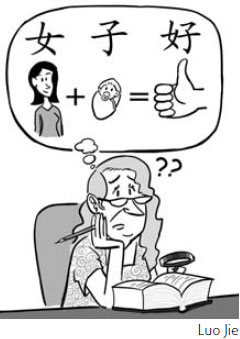Wild and whacky world inhabited by Chinese characters
By Lisa Carducci ( China Daily ) Updated: 2009-03-05 09:31:07Repeating a character gives it a different meaning: one mu is a tree but put two mu characters side by side and you have a wood (lin), while three make a forest (sen). A single person (ren) doesn't make an audience - but three (zhong) do. If you are very happy (gao xing) you are gao gao xing xing!

Chinese language is also very descriptive: A computer is an "electric brain" (dian nao); a radio is literally a "receive sound machine" (shou yin ji); a thermometer (han shu biao) is a "cold-heat measure instrument"; and a plane (fei ji), a flying machine.
Sometimes words don't mean what they say. For instance, guan xin doesn't mean "to close your heart", but to open it to those who need you. Similarly, just like xiao xin doesn't mean "little heart", but to be cautious. Gai si literally means "should die" but is used as a swear word in a sentence like "Damn! It's going to rain again today."
When Chinese people see someone slip and fall in the street, they will tell them to "Man yi dianr!" or "Go slowly". But isn't it too late to go slowly?
Last week I watched a Chinese movie on TV, a story set in the Qing Dynasty. A fearless fighter killed four or five opponents with his spade but ended up with a knife in his chest, the whole blade mind you, right up to the handle.
He staggered a little, then leant on a tree. His beloved fiance quickly came to him and asked: "Mei shi'r ma?"(You have nothing?) I could not but laugh thinking how many knives the girl could stand before thinking her fianc might accept "you shi'r"!
I laughed even more when the soldier comforted her, saying: "Wo mei shi'r!" (I'm fine.) How brave! He was alive, so what is a knife in your chest between friends?
|
|
|
|
|
|
|
|


























 Raymond Zhou:
Raymond Zhou: Pauline D Loh:
Pauline D Loh: Hot Pot
Hot Pot Eco China
Eco China China Dream
China Dream China Face
China Face






